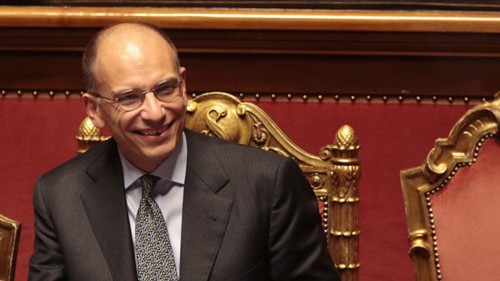(VOVworld)- Italian Prime Minister Enrico Letta won a confidence vote in parliament on Wednesday after Silvio Berlusconi, facing revolt in his own center-right party, backtracked on threats to bring down the government. The former Prime Minister’s decision helped Italy avoid a serious political crisis. Letta is still facing with numerous economic challenges.

Italian Prime Minister Enrico Letta- Photo: Reuters |
Historic day for Prime Minister Enrico Letta
One day before the Parliament vote, Italy was facing a political crisis after Berlusconi’s People of Freedom Party withdrew its 5 Ministers from the coalition with Letta’s Democratic Party.
However, Letta’s speech to the Upper House promising to reduce taxes, reform the economy and judiciary reversed his predecessor’s position from opposing to supporting the government.
This surprising decision came as a relief. Speaking to reporters after winning the vote in the Upper House, Prime Minister Letta said it was a historic day and the future was now brighter for Italy. Earlier, Letta stressed the vital importance of political stability for Italy to implement economic reforms to overcome its longest economic downturn in 20 years.
Challenges lie ahead
After winning the vote of confidence in Parliament, Letta now faces economic challenges. He says he aims to boost Italy’s economy 1% next year and more in the following years. He also promised to respect fiscal regulations limiting the budget deficit to 3% of GDP, the limit set for EU members.
This target is based on a report of the Italian Statistics agency, ISTAT which shows that Italy’s economic recession slowed down in the last 8 months. One expert predicts that in the fourth quarter of this year, Italy’s economy is likely to recover.
But, it won’t be easy for Letta’s administration to achieve these targets with numerous challenges facing Italy’s economy. The GDP in the second quarter of this year was 0.3% lower than the previous quarter, the 8th consecutive minus-growth quarter. Italy is one of the countries with the highest public debt in Europe. Forecasts suggest that Italy’s public debt this year will surpass 2 trillion euros, 132.9% of GDP, much higher than last year’s 127% of GDP.
The stagnant economy has resulted in increasing unemployment. The Italian Statistics Agency reported that in August the unemployment rate was 12.2%, compared with 12.1% in July.
In addition, the ruling coalition has become fragile, a fact clearly seen in Wednesday’s Parliament vote.
As the third biggest country in the eurozone, any instability in Italy is likely to affect the entire region. Prime Minister Letta’s victory in the vote of confidence creates an opportunity for his coalition government to continue economic reforms.